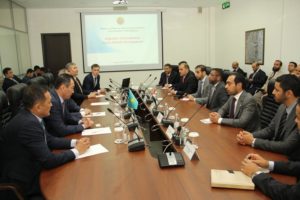
Representatives of the National Defense College of the United Arab Emirates visited Kazakhstan’s National Space Center and were acquainted with the work of JSC NC Kazakhstan Garysh Sapary, a Kazinform correspondent reports.
The UAE delegation included senior military officers, attending the College, among whom are the military attaché at the Embassy of the United Arab Emirates in Astana, Brigadier General Rasheed Ali Seif Al Mahrazi, and deputy attaché Ahmad Naser Duman Al Amri.
During the visit to the company’s facilities, president of Kazakhstan Garysh Sapary, Yergazy Nurgaliyev, told foreign guests about the implementation of space projects.
The guests were familiarized with the work of the Earth remote sensing system KazEOSat and the system for high-precision satellite navigation.
The UAE delegation was briefed on the progress of the spacecraft assembly and testing complex construction, that in the future will be producing various purpose satellites and components for them.
As previously reported, Kazakhstan Garysh Sapary is also working on a space system for scientific and technological purposes, which will be launched in 2018.
The UAE generals highly praised Kazakhstan’s achievements in the field of space science and technology and noted that Kazakhstan-UAE relations are gaining momentum in terms of cooperation in defence industry and space technologies.
Original published at: https://spacewatch.global/2017/11/uae-delegation-visits-kazakhstans-national-space-centre/
 SpaceWatch.Global An independent perspective on space
SpaceWatch.Global An independent perspective on space

